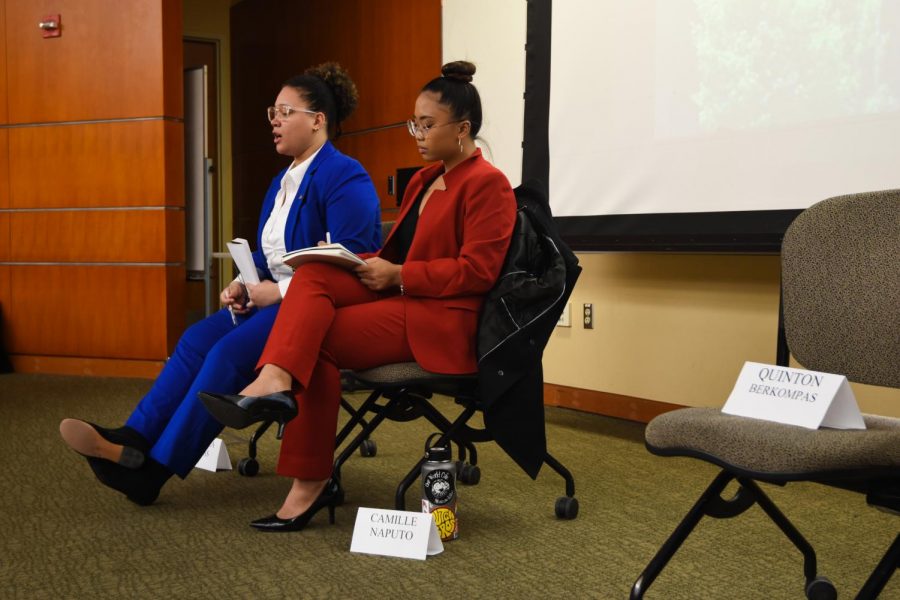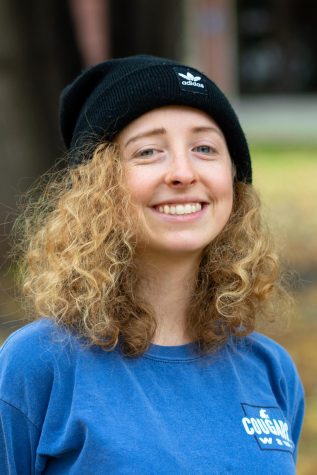Judicial Board redacts injunction on multicultural debate
ASWSU Chief Justice says board was in the right to temporarily halt event
JOSEPH GARDNER | THE DAILY EVERGREEN
ASWSU presidential candidate Mariela Frias-Gomez, left, and vice presidential candidate Camille Naputo answer questions relating to their campaign at the Run WSU’s Multicultural Debate on Sunday in CUE 202. Opponents Quinton Berkompas and Jhordin Prescott, running for president and vice president respectively, could not come to the debate.
March 4, 2019
The ASWSU Judicial Board filed an injunction, or a legal order, to halt a multicultural debate for presidential candidates hours before it was scheduled to occur.
Patrick Granger, WSU student, said he filed a motion on Saturday to suspend a debate hosted by Run WSU in association with four multicultural ASWSU committees. He helped with the Quinton Berkompas and Jhordin Prescott campaign early on but is not as involved anymore.
“I saw that Quinton had made a post on Facebook that basically said he was being treated differently than Mariela’s campaign,” Granger said. “I wanted to make sure they were being treated fairly.”
The ASWSU Judicial Board ruled that Run WSU violated ASWSU Bylaw 710.14 regarding third-party sponsorship of campaign events, according to the preliminary injunction on Sunday morning. Chief Justice Jessica Kadinger said the board was in the right to temporarily suspend the event until they could evaluate how the debate fell within the bylaws and election codes.
It was later redacted after further assessment by the judicial board.
“We realized after discussing it a little more, and after receiving new information, that there was more to it than what was initially presented to us,” said Associate Justice Kevin Kissinger. “We redacted that order of injunction and said we were going to review it more.”
The judicial board will be reviewing the bylaw in order to clarify its vagueness, such as defining what classifies as a campaign event, Kissinger said.
Harald Hyllseth, a Run WSU board member, said Run WSU decided to host the event after learning that the ASWSU Election Board was not going to hold a multicultural town hall or debate.
“Last year’s town hall had a really conducive environment, and I feel that having that taken away this year doesn’t provide both tickets the space to get their word out,” said Rachael Spear, a Run WSU board member. “We thought that we would host it this year because of our values as an organization.”
Hyllseth said he reached out to both campaigns last Monday regarding the debate and received a response from Mariela Frias-Gomez and Camille Naputo. There was no immediate response from Berkompas and Prescott. After further discussion, he said they realized time conflicts among the involved parties, Hyllseth said.
Run WSU messaged all four candidates regarding their decision to run the debate 2:30 p.m. Sunday, regardless of whether or not the candidates attended, he said. If no one showed up, there would be a discussion about the general debate later in the day. The group posted information about the event on their Facebook page on Thursday evening.
“Please remove this Facebook event or set the date and time to (TBD) so we can determine a date and time that works for both tickets to participate. Students deserve to hear from both sides to make an informed choice in the election,” Berkompas wrote on Facebook on Friday morning.
The multicultural event took place at the original time on Sunday and candidates Frias-Gomez and Naputo attended. Berkompas and Prescott could not.
“We’re here for students. I think it’s unfortunate that they are not here … and not say their message to who is here today,” Naputo said.
Without both tickets at the event, the debate became a town hall meeting.
Frias-Gomez and Naputo said they planned on making changes within ASWSU by emphasizing communication to all groups in the WSU community. They said everybody within the executive board should be more involved in the general student body and learn how to be an advocate for everyone.
Naputo said they want to restructure ASWSU’s tone because it currently does not feel welcoming.
“Including the entire student population isn’t impossible,” she said.
Additionally, the pair said they want to be proactive and push to educate students regarding social competency.
Frias-Gomez and Naputo said they want to work toward making the campus more inclusive to international students, especially through overcoming language barriers on campus.
“It’s about coming together to advocate for all students,” Naputo said.











